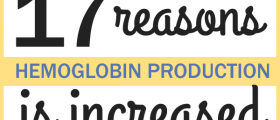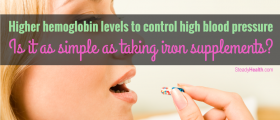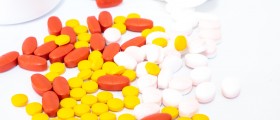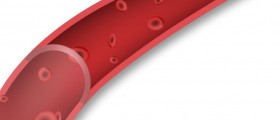
Hemoglobin deficiency is a common condition that occurs when the hemoglobin levels drop below the normal values. In this article we will discuss causes, symptoms and treatment of hemoglobin deficiency.
What is Hemoglobin Deficiency?
Hemoglobin is a metalloprotein which carries oxygen in the red blood cells throughout the body. Due to hemoglobin each body cells is supplied with oxygen. Heme is the protein found in hemoglobin and it binds oxygen. Normally, blood hemoglobin levels can range from 13.8 to 18.2 g/dL in men, from 12.1 to 15.1 g/dL in women and from 11 to 16 g/dL in children. However, drop in normal hemoglobin levels leads to hemoglobin deficiency or iron deficiency anemia. Low blood iron levels cause anemia due to low hemoglobin levels in the blood. As a result, the affected person may suffer from shortness of breath, fatigue and feeling of tiredness. Usually, anemia is a short-term ailment that can be reversed with increased intake of iron rich foods. However, if it is not promptly treated, anemia can sometimes develop into chronic and a life threatening condition.
Causes of Hemoglobin Deficiency
Hemoglobin deficiency may occur due to a number of causes. The leading cause of the condition is deficiency in dietary iron. Also, there are many health conditions which can lead to deficiency in hemoglobin. They include gastrointestinal problems, heavy blood loss, uterine fibroids, colon polyps and other conditions. Increase in the production of red blood cells can also result in hemoglobin deficiency because the very production requires more iron. This is common in pregnant women, breastfeeding women, growing children and adolescents. The leading cause of deficiency of hemoglobin in children is insufficient intake of dietary iron.
Gastrointestinal problems can cause poor absorption of iron in the intestine leading to deficiency of hemoglobin. Excessive loss of blood that may be a result of heavy menstrual bleeding, an injury, childbirth or peptic ulcer bleeding is one of the common causes of hemoglobin deficiency. Also, the condition can develop due to sickle cell anemia, hiatal hernia bleeding, colorectal cancer, bladder cancer and kidney cancer.
Symptoms of Hemoglobin Deficiency
Mild to moderate cases of hemoglobin deficiency may cause vague symptoms. Low hemoglobin levels in blood commonly cause weakness, fatigue, general malaise, shortness of breath, dizziness and heart palpitations. Also, hemoglobin deficiency is often accompanied by chest pain, coldness in the hands and feet, pale skin, brittle nails, headache and swelling or soreness of the tongue. Difficulty concentrating and increased risk for lead poisoning and infections are also associated with hemoglobin deficiency.
Treatment for Hemoglobin Deficiency
Hemoglobin deficiency is treated with dietary changes that involve increased intake of food rich in iron and use of iron supplements. Foods high in iron include red meat, liver, chicken, turkey, beans, leafy green vegetables like spinach and broccoli, egg yolk and sardines.

















Your thoughts on this
Loading...